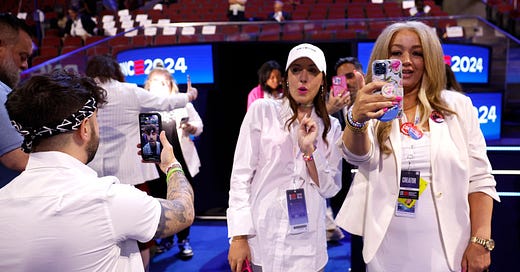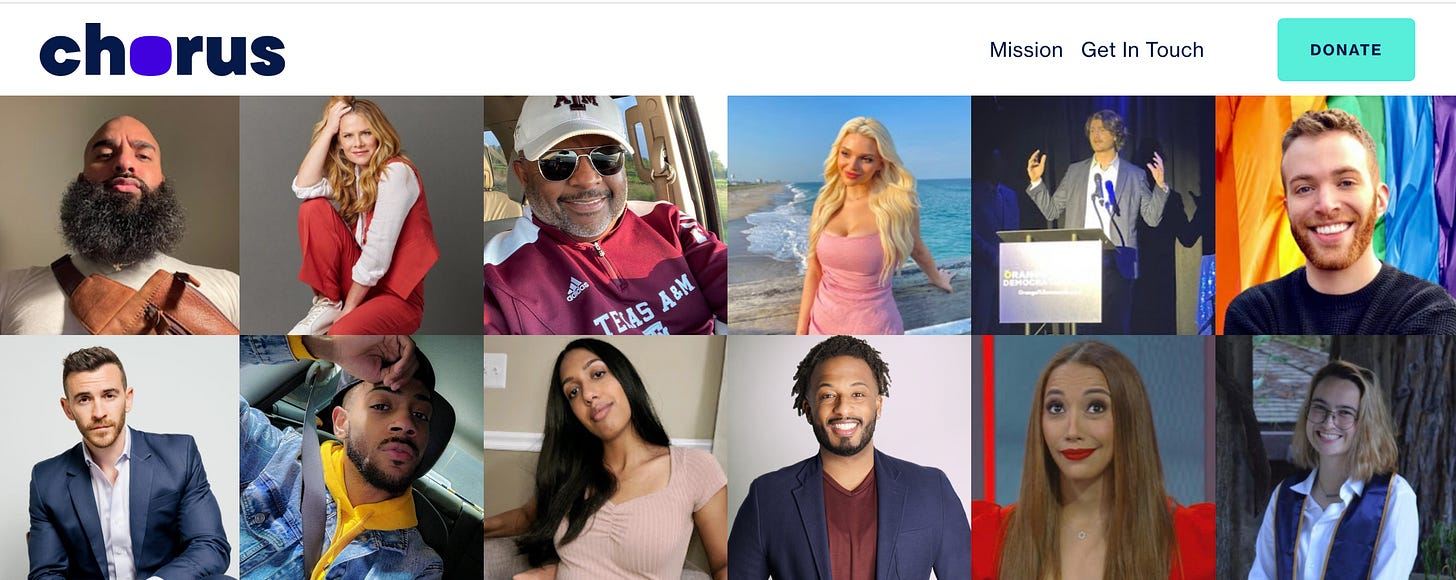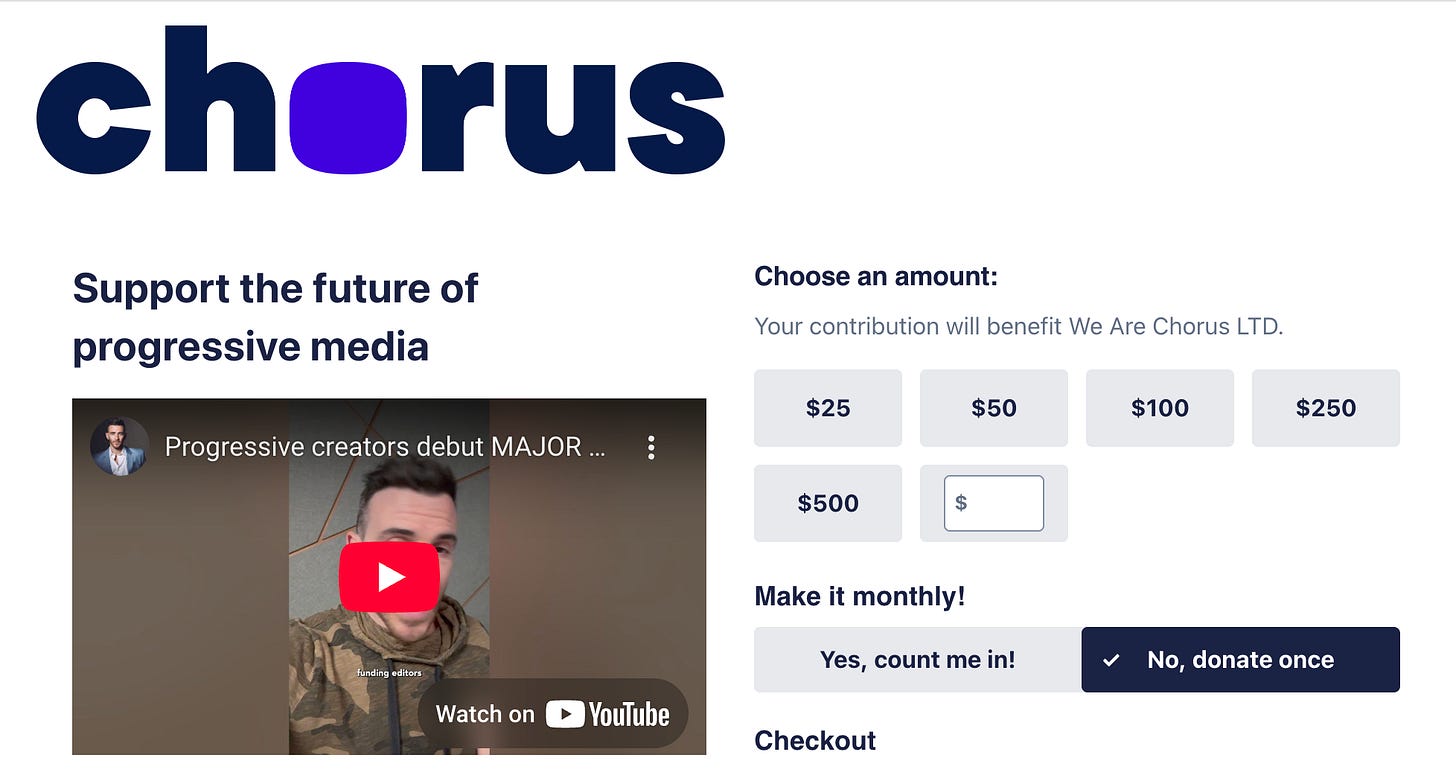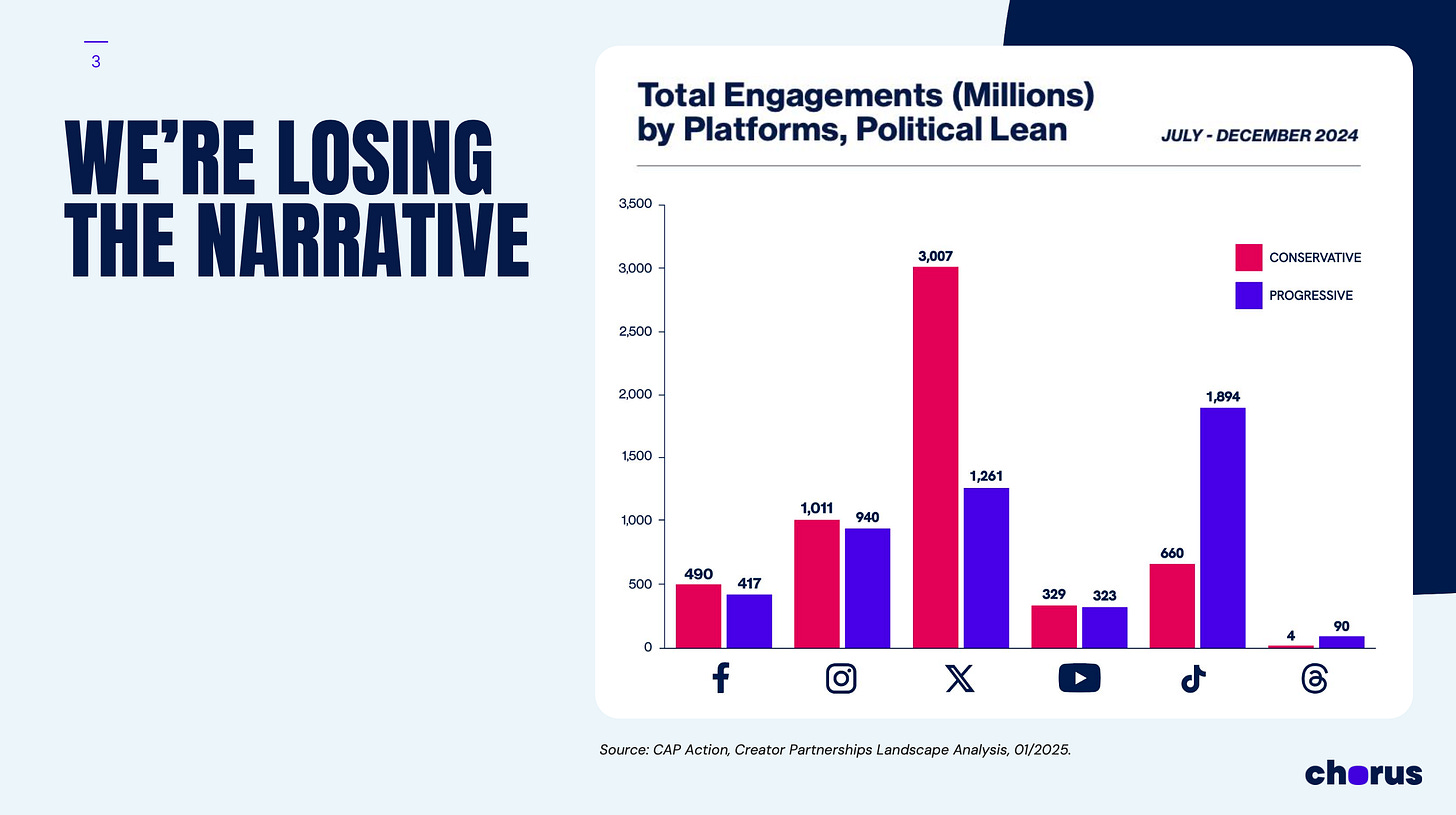Inside the Democrats’ Struggle to Win Over Creators
"What we need is for people to invest in independent media, and that doesn't necessarily mean investing in a consulting group that is going to become a middleman for independent media."
To unlock more of my reporting on how the internet is reshaping politics, business, media, and culture, and to read my deep dives into emerging online spaces and internet trends, become a paid subscriber today!
I cannot produce this newsletter without your financial support. Your money goes directly towards reporting costs.
In early March, a group of liberal influencers showed up at the Capitol for Trump's joint address to congress. They were brought by Chorus, a new nonprofit founded to facilitate connections between Democrat lawmakers and independent influencers. The goal was to get the creators to create content promoting Democratic messaging.
The event was marketed to creators as an opportunity to interview members of congress. When they showed up, however, it became apparent that Chorus hadn't actually booked interviews for anyone aside from Brian Tyler Cohen, a liberal YouTuber and co-founder of Chorus.
"It was essentially, go to the Rayburn building and go trick or treating for interviews," one creator who attended the event said. "It was so embarrassing and it didn't put us in the position to make good content."
After knocking on the doors of lawmakers' offices unannounced, creators were able to secure some decent content. Collectively, the group’s content generated over 53 million views. But afterwards, they were asked to submit the content they created to Chorus in order to get their travel costs reimbursed. No creators were paid for the content they made. This irked the creators, who felt like Chorus now wanted to use their content to put into a deck in order to show the Democrats who hired Chorus how successful their activation was. When in reality, the creators say they received little to no support.
“It was their first test as a collective," said V Spehar, a liberal content creator with over 3.5 million followers on TikTok. "I wasn’t there, but it didn’t look like it went so well. Creators made good content, [but] they would have that content without Chorus." Spehar said that Chorus' poor planning made the creators appear "very awkward, very amateur."
"While not everyone who went to DC with CHORUS had the same experience, this trip led to dozens of interviews and posts that generated… an audience more than 50 percent bigger than for the speech itself,” Cohen said in a statement through a comms representative. “I'm proud that an organization only a few months old had that kind of impact and we're iterating so the experience and our reach can be even bigger next time."
After Trump's election, the Democrats faced a reckoning. It was clear that the party had failed to successfully navigate the media landscape and build meaningful relationships with content creators. A growing consensus emerged within the party: the left was losing the information war. While the right has spent decades building a powerful and robust independent media infrastructure, the Democrats relied on outdated strategies and underfunded digital efforts. Pundits called on the party to cultivate a "Joe Rogan of the left" in order to better sway the digital masses to their side.
Six months later, the results of their efforts have been mixed. The Democrats have begun to engage more with the creator world, but their efforts have been, at times, slapdash, plagued by internal power struggles and warped by the influence of big money donors and out of touch voices within the Democratic establishment. Leftist and progressive influencers say that they still feel shunned by the party, as big name Democrat figures cozy up to right wing content creators.
One influencer described the state of Democratic politics right now as similar to the selection of the next Pope. “It’s like our own little Conclave, who will reign supreme?”
Emily Amick, a left leaning content creator, said that it was a good thing that Democrats "have started acknowledging the existence of influencers in 2025," however, "the right has massive infrastructure of support and there's a commercial ecosystem for them. It's a viable economic opportunity for people [to become a right wing content creator]. So, they have a much bigger ecosystem of people who have big platforms."
This economic disparity has led to frustration and anger among many progressive influencers.
Just weeks after the election, Democratic strategist Stuart Perelmuter and liberal YouTuber Brian Tyler Cohen announced Chorus, a non profit arm of a company called Good Influence, which functions as an influencer marketing agency and network that partners cause-focused creators with paid campaign opportunities.
The goal of Chorus, according to a fundraising deck, is to "build new infrastructure to fund independent progressive voices online at scale." The organization claims that it seeks to "use the talents of its roster to help one another hyper scale their audiences and break through across all platforms."
A slew of well known creators were featured on the Chorus website at launch, their faces positioned below a gigantic DONATE button. Users who click the donate button are taken to a fundraising page that reads "Supporting Chorus means supporting independent online voices and building the next era for online news and conversation."
But donations made via the page do not go directly to the creators pictured, as some people who donated believed. In fact, none of the money Chorus has raised so far has gone to directly compensating creators for their work. Several creators featured on Chorus' website were frustrated that they were included on the page and used to solicit small dollar donations without their consent.
Progressive influencer Kat Abughazaleh who's running for congress in Illinois was pictured on Chorus' website and included in fundraising decks without her permission. She asked that her likeness be removed. Other creators currently featured on the website said that they did not consent to having their image used online or for fundraising.
"CHORUS came together quickly on a few Zoom calls with creators after November and we've been running at a full sprint since then,” Cohen said in a statement through his comms representative. “As a creator, I would never want to put another creator in a difficult position for any reason and we removed Kat when she asked."
Allie O'Brien, a progressive creator who's currently featured on CHORUS' website below the donate button, said that the company must have just taken an image of her off social media. "I did not even know that I was on the website, I am not financially tied to them at all," she said.
Spehar said that she too was included in Chorus' pitch decks without her consent. "I was included on some [of Chorus'] decks like, ‘we have access to V,' when you do not," Spehar said. "I’m not in any collective at all. That’s my problem with the way it went down. I don’t think anyone should be pitching me other than me… What we need is for people to invest in independent media, and that doesn't necessarily mean investing in a consulting group that is going to become a middleman for independent media."
Chorus' efforts to act as a bridge between creators and political leaders has ruffled the feathers of influencer management companies and talent agencies, whose job it is to negotiate opportunities for their creators. These managers and agents feel that Chorus is acting as if they represent their clients when they don't, and they worry that it's making it harder for creators to negotiate opportunities directly with politicians and lawmakers.
"[Chorus] understands the political ecosystem," one long standing marketer in the influencer space who asked to remain anonymous said, "they understand how donors think and how money gets raised. But they don't know anything about the creator space."
Representatives for big name creators said that they feel like Chorus is luring their clients with promises of access to political leaders, "then they go to a bunch of donors who don't know anything about the creator space except that we need a left wing Joe Rogan, and they raise money from them. These are dollars that belong to the creators," the marketer said.
Another representative at a major Hollywood agency who asked to remain anonymous, said that Chorus "has no respect for how entertainment works. They think that they're smarter than the agents and the agencies. You can get away with it in the short term, but they're going to get the party blackballed. There are only so many times that [agents] will allow some middleman to take dollars from our entertainers before they're like fuck these people, and they're getting very close to that."
After independent journalist Tara Palmeri, who contributed reporting to this story, and I reached out to Chorus for comment, the organization sent an email blast out to the creators in their network reading, "Some reporters are reaching out to creators about Chorus, and it seems not with great intentions. Asking how they feel about an org raising money off creators (spoiler: the money is to support the creators)."
A comms representative for the company said that Chorus has covered travel costs for some creators, and that it's still a young organization. “After losing an election because of the huge disparity between the right-wing and progressive media ecosystems, we should be focused on getting as many creators, through as many efforts as possible, more support. Anyone focused on disparaging efforts to fight back right now and save our democracy should reassess their priorities," Cohen said in a statement.
Cohen clarified, through a representative, that the money Chorus has raised so far has gone to "building the infrastructure needed to scale this effort" and things like legal fees to establish Chorus as a nonprofit, and to build out a media strategy.
Harry Sisson, a liberal content creator who worked closely with the Democrats over the past couple years, said that the most important thing is that the party is able to build a long term messaging and rapid response strategy that isn't bogged down with red tape.
"I've found that I've worked best with elected officials or just people in politics, generally, when there's not a middleman," he said. "I feel like it can kind of complicate things. That direct contact I've found to be significantly better than, for example, [a lawmaker] reaching out to Chorus, and Chorus reaching out to us, and then going from there."
Some creators have also felt excluded by Chorus. They worry that the organization is functioning as a gatekeeper, excluding those who they feel like haven't been sufficiently loyal to the DNC establishment. “Chorus seems to prioritize certain creators more than others," Spehar said.
Some of these issues might be remedied as the Democrats build a more comprehensive media strategy.
Several creators were excited to hear that the Democrats had hired Tim Hogan, a former comms director for Amy Klobuchar’s 2020 presidential campaign and director of campaign communications at The Hub Project, a left leaning advocacy group, as the DNC's new Senior Advisor for Messaging, Mobilization and Strategy. Under his new role, Hogan is tasked with expanding the Democrats' creator efforts and building relationships with new media and overseeing a new "war room" to counter Trump messaging.
"Tim Hogan will aggressively scale its rapid response operation, innovate in the media and information ecosystem," the DNC said in a post announcing his hiring. The post added that, "the DNC is building out a robust influencer engagement operation."
Hogan only started a couple weeks ago, but has connections with some big name YouTubers. Influencers said that he seems like the type of person to work with a wide range of creators.
On the Senate side, Cory Booker's office has also been taking steps to build out a broader creator strategy. He is working on putting together a new committee aimed at helping the Democrats learn about social media, and Booker has been attempting to set up a formal creator briefing system to keep new media personalities in the loop on key issues and pieces of legislation. Liz Hagelthorn, a long-time veteran of the creator industry who founded a successful meme page network and consulted on creator partnerships for Harris is reportedly consulting for Booker on creator strategy. Hagelthorn declined to comment.
On the house side, Mayra Cuevas, who worked on influencer relations for the Harris campaign, has been hired as the U.S. House of Representatives content partnerships manager. Rep. Maxwell Frost's office has also been helping to orchestrate a lot of creator efforts for Democrat members in the House.
Sen. Bernie Sanders and Rep. Alexandria Ocasio-Cortez recently invited dozens of content creators to the Los Angeles stop on their Stop Oligarchy tour. Creators were given exclusive access to Sanders and Ocasio-Cortez along with other lawmakers in attendance including Frost and Rep. Ro Khanna, who was partnering with Twitch streamers and YouTubers back in 2023 to push his policy agenda. Creators at the Stop Oligarchy tour's coverage generated millions of collective views across platforms. Leftist Twitch streamer Hasan Piker did a multi hour stream from the event.
Several creators at the Stop Oligarchy tour said that they were thrilled to be acknowledged by more progressive members of the party, but were frustrated that big figures in the Democratic establishment seemed more willing to partner with right wing influencers than those who are further left on their own side.
When Gavin Newsom launched his podcast in February, his first guests included Charlie Kirk and Steve Bannon. This week, Pete Buttigieg went on Trump-supporting comedian Andrew Schulz's podcast.
Victoria Hammett, a 26 year old progressive content creator in Los Angeles, said that the Democratic establishment's refusal to engage meaningfully with the more progressive content creator ecosystem on the left is harming them in multiple ways.
For one, they aren't able to tap into the younger, hyper engaged audience of many of the most culturally-relevant creators on the left, who skew more progressive. Also, "those creators have a perspective that is incredibly important and is representative of the average voter," Hammit said. Ignoring these creators' perspectives keeps Democrats in a bubble, and they become out of touch and lose, she explained.
Hammett said that Democrats' poor tech policy decisions have also hurt their reputation in the creator community. Biden and many Democrat lawmakers' insistence on banning TikTok, for instance, over pro-Palestinian speech, angered many in the influencer world. And their support for things like more aggressive content moderation and speech restrictions online through backing bills like the Kids Online Safety Act, has painted them as out of touch and hostile to the creator industry.
"Right wingers control all the social media platforms right now," Hammett said, "and the right is investing so much money in new media content creation."
Another major hurdle the Democrats are up against is funding. Creators on the right are extremely well funded by a mix of interest groups, billionaire donors, and moneyed interests. The most culturally relevant young progressive content creators, however, receive zero support or funding. There is no infrastructure for big money donors to identify and fund independent media businesses, and no one on the left to supercharge creators' growth on the back end like the right does, by boosting right wing content on platforms like YouTube and TikTok.
This means that many creators on the left simply don't have the same massive following as creators on the right. Politicians then look at the right's inflated numbers, and fall for it. They aren't adept at the internet enough to realize that much of it is smoke and mirrors.
"A lot of digital people [in Democratic politics] are looking at just the metric of followers when they decide whether the lawmaker should go on a thing," said the administrator of Organizer Memes, a liberal meme account. "A lot of left content creators are not big compared to the right."
"Democrats] are now looking at this space and they're misunderstanding the dynamics of the right wing media and what they actually do," said Annie Wu Henry, a digital strategist who has consulted on creator strategy for Democratic lawmakers. "These people are like, 'we need a Joe Rogan of the left, we need a turning point of the left, we need a Barstool of the left.' But they have not taken the time to fully understand how each of those things operate together within the right's ecosystem."
"Maybe it's time to listen to people who have been doing this work all along," Henry said. "There have been operatives, organizers and strategists talking about this work for years, and a lot of people were ringing the alarm bell, but they were called too critical and ignored."
Jennifer Ancona, co-founder of Way to Win, a progressive donor network, has a long history in the creator industry, dating back to when she was a blogger. She said that Democrats must recognize that there are tons of people who have been working in the influencer industry for years, and that they should be "empowering people who have been living and breathing this digital world for a long time," rather than trying to build from scratch.
Ancona also said that the Democrats must do more to reach out to progressive creators on their own side and build relationships, even when those creators might disagree on hot button issues. "I think we have to bring more humility and more trust and more, just general willingness to support people and ideas that we may not agree with but that have to be part of the solution going forward," she said.
"I don't know if the question is whether or not they've learned [their lesson]," she said. "It's, are they willing to learn?"
What I’m reading
'Health Freedom' is a Fraud. What We Need is a Right to Health
The “health freedom” movement’s political ascendance has come about in a time of deep institutional mistrust. But it is a sham that will not actually make people healthier. To achieve this, we need to establish a collective right to health. - Current Affairs
They Criticized Musk on X. Then Their Reach Collapsed.
Users who publicly disagree with Musk had their content shadowbanned, their accounts restricted, and saw views for their posts plummet. - NY Times
Theo Von Dismantles the Interview Show
The comedian and podcaster is one of the defining conversationalists of media’s new MAGA-friendly mainstream. But he can be harder to pin down, politically and culturally, than his bro-cast peers. - NY Times
A Subdued Musk Backs Away From Washington, but His Project Remains
The Department of Government Efficiency has already made an immense imprint on the government, but it has not come close to Elon Musk’s pledge of cutting $1 trillion. - NY Times
YouTube, at 20, Has Hosted 20 Trillion Videos and Launched Superstars. It Wants More—Including Some Prestige
Inside the platform that gave us Hot Ones, Michelle Khare, Chicken Shop Date, and Good Mythical Morning—not to mention Justin Bieber and MrBeast—as it embraces bingeability and more. - Vanity Fair
Addison Rae Knows You Can’t Stop Watching Her
The TikTok phenom is going to be a pop star—whether you like it or not. - Elle
What I’m watching
User Mag news rundown
Pete Hegseth has ordered a makeup studio installed at Pentagon.
Experiments to dim the Sun are set to be approved within weeks as scientists consider brightening clouds to reflect sunshine in ways to prevent climate change.
Passengers say they were trapped inside driverless vehicle in Austin.
Driverless trucks are descending on Texas.
Andy Beshear, the Democratic Kentucky Governor, is the latest potential 2028 presidential hopeful to launch a podcast.
A good look back at the Kardashian-Jenner apps.
When asked to predict the next pope, AI bots are hedging their bets.
The founder of Business Insider is being roasted over a blog post where he reveals how he fell in love with one of his AI workers.
Meta's Oversight Board says Meta's new hate speech policies were “announced hastily” in January 2025 and asks Meta to assess the impact on vulnerable users.
Wild chimps indulge in booze-fueled feasts, rare video shows.
Patriotic, macho and anti-woke: UFC has become a haven for the Maga mindset.
Chipotle will open restaurants in Mexico for the first time.
For more great content follow my meme page, subscribe to my YouTube channel, and join my Instagram broadcast channel where I share links all week long.
Listen to my podcast Power User on Apple Podcasts:
Or follow Power User on Spotify:










Fascinating article! This is the content I’m here for
I remember when Chorus launched how weird it was that it included links to no one. No names. Just pictures of people I never heard of. Asked myself how was chorus asking me to support these creators outside of giving Chorus money.